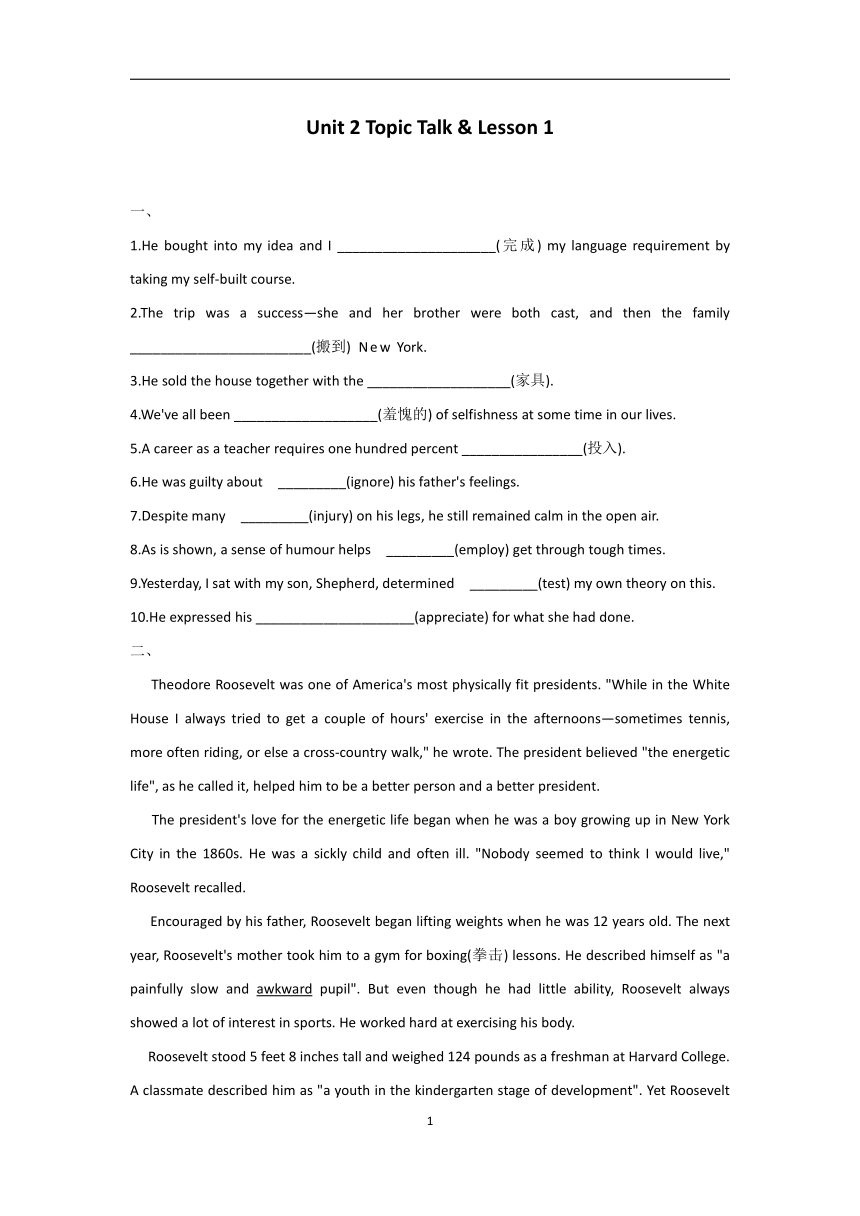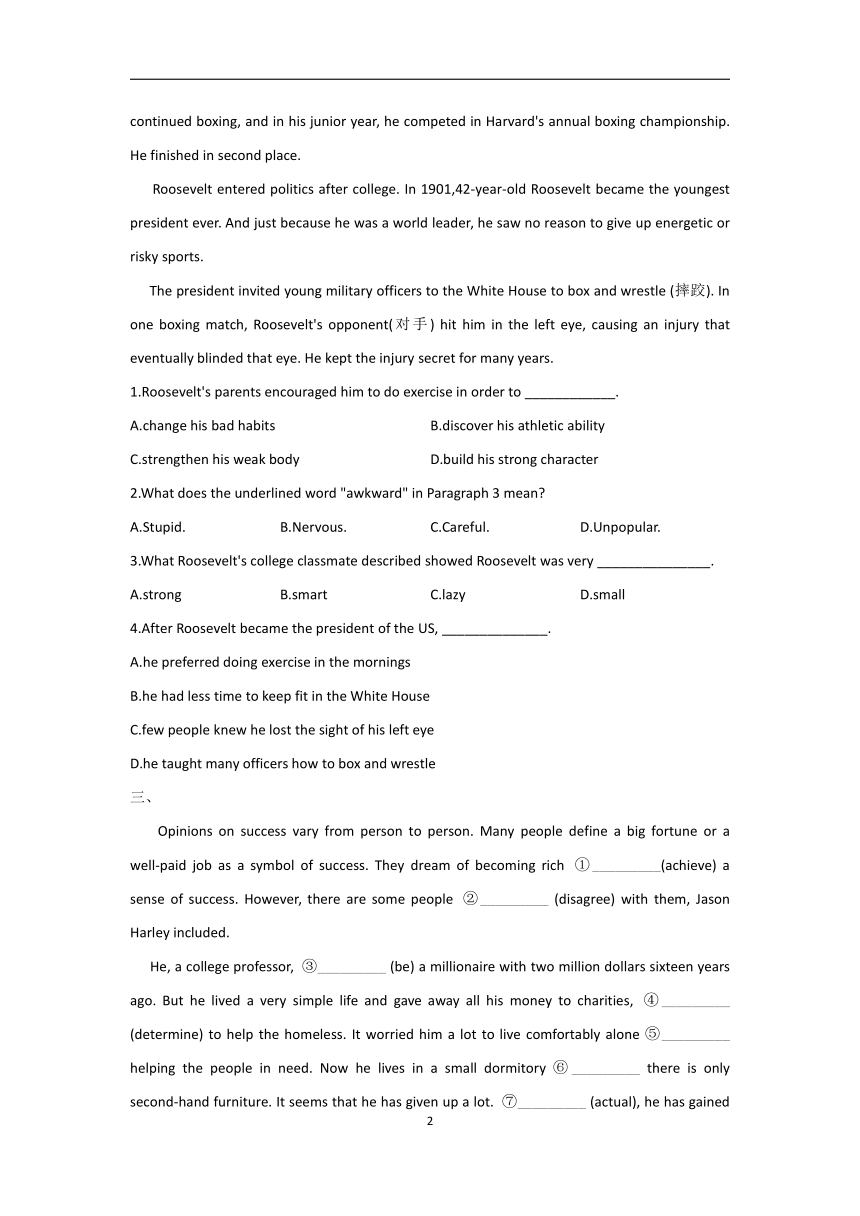北师大版(2019) 选择性必修 第一册 Unit 2 Success Lesson 1 Money vs Success 随堂检测(含解析)
文档属性
| 名称 | 北师大版(2019) 选择性必修 第一册 Unit 2 Success Lesson 1 Money vs Success 随堂检测(含解析) |

|
|
| 格式 | docx | ||
| 文件大小 | 23.6KB | ||
| 资源类型 | 教案 | ||
| 版本资源 | 北师大版(2019) | ||
| 科目 | 英语 | ||
| 更新时间 | 2023-05-08 00:00:00 | ||
图片预览


文档简介
Unit 2 Topic Talk & Lesson 1
一、
1.He bought into my idea and I _____________________(完成) my language requirement by taking my self-built course.
2.The trip was a success—she and her brother were both cast, and then the family ________________________(搬到) New York.
3.He sold the house together with the ___________________(家具).
4.We've all been ___________________(羞愧的) of selfishness at some time in our lives.
5.A career as a teacher requires one hundred percent ________________(投入).
6.He was guilty about _________(ignore) his father's feelings.
7.Despite many _________(injury) on his legs, he still remained calm in the open air.
8.As is shown, a sense of humour helps _________(employ) get through tough times.
9.Yesterday, I sat with my son, Shepherd, determined _________(test) my own theory on this.
10.He expressed his _____________________(appreciate) for what she had done.
二、
Theodore Roosevelt was one of America's most physically fit presidents. "While in the White House I always tried to get a couple of hours' exercise in the afternoons—sometimes tennis, more often riding, or else a cross-country walk," he wrote. The president believed "the energetic life", as he called it, helped him to be a better person and a better president.
The president's love for the energetic life began when he was a boy growing up in New York City in the 1860s. He was a sickly child and often ill. "Nobody seemed to think I would live," Roosevelt recalled.
Encouraged by his father, Roosevelt began lifting weights when he was 12 years old. The next year, Roosevelt's mother took him to a gym for boxing(拳击) lessons. He described himself as "a painfully slow and awkward pupil". But even though he had little ability, Roosevelt always showed a lot of interest in sports. He worked hard at exercising his body.
Roosevelt stood 5 feet 8 inches tall and weighed 124 pounds as a freshman at Harvard College. A classmate described him as "a youth in the kindergarten stage of development". Yet Roosevelt continued boxing, and in his junior year, he competed in Harvard's annual boxing championship. He finished in second place.
Roosevelt entered politics after college. In 1901,42-year-old Roosevelt became the youngest president ever. And just because he was a world leader, he saw no reason to give up energetic or risky sports.
The president invited young military officers to the White House to box and wrestle (摔跤). In one boxing match, Roosevelt's opponent(对手) hit him in the left eye, causing an injury that eventually blinded that eye. He kept the injury secret for many years.
1.Roosevelt's parents encouraged him to do exercise in order to ____________.
A.change his bad habits B.discover his athletic ability
C.strengthen his weak body D.build his strong character
2.What does the underlined word "awkward" in Paragraph 3 mean
A.Stupid. B.Nervous. C.Careful. D.Unpopular.
3.What Roosevelt's college classmate described showed Roosevelt was very _______________.
A.strong B.smart C.lazy D.small
4.After Roosevelt became the president of the US, ______________.
A.he preferred doing exercise in the mornings
B.he had less time to keep fit in the White House
C.few people knew he lost the sight of his left eye
D.he taught many officers how to box and wrestle
三、
Opinions on success vary from person to person. Many people define a big fortune or a well-paid job as a symbol of success. They dream of becoming rich ①_________(achieve) a sense of success. However, there are some people ②_________ (disagree) with them, Jason Harley included.
He, a college professor, ③_________ (be) a millionaire with two million dollars sixteen years ago. But he lived a very simple life and gave away all his money to charities, ④_________ (determine) to help the homeless. It worried him a lot to live comfortably alone ⑤_________ helping the people in need. Now he lives in a small dormitory ⑥_________ there is only second-hand furniture. It seems that he has given up a lot. ⑦_________ (actual), he has gained more instead.
As far as he is concerned, the real sense of ⑧_________ (satisfy) and success comes from the small efforts which make ⑨_________ big difference to others. Success is not measured by money but depends on ⑩_________ that one had figured out the true meaning of life.
答案以及解析
一、
1.答案:completed
2.答案:moved to
3.答案:furniture
4.答案:guilty
5.答案:commitment
6.答案:ignoring
解析:句意为:他很内疚自己忽略了父亲的感受。feel/be guilty about doing sth为固定搭配,意为“对做某事感到内疚”,介词about后接动名词作宾语,故填ignoring。
7.答案:injuries
解析:句意为:尽管腿上有多处伤口,他在户外依然保持镇静。根据空前的many可知,设空处应填复数形式。
8.答案:employees
解析:句意为:据显示,幽默感能帮助员工们熬过艰难时期。设空处作helps的宾语,应用名词,根据语境可知此处表示“雇员”,且表泛指,应用复数形式,故填employees。
9.答案:to test
解析: 句意为:昨天,我和我的儿子谢泼德坐在一起,决定测试我自己对这个(事情)的理论。此处为形容词短语作状语,determined to do sth意为“决定做某事”,故填to test。
10.答案:appreciation
二、
答案:1-4.CADC
解析:1.推理判断题。根据文章第二段中的"He was a sickly child and often ill. 'Nobody seemed to think I would live,' Roosevelt recalled.(他是个多病的孩子,经常生病。‘似乎没人认为我能活下来,’罗斯福回忆道。)"以及第三段第一句"Encouraged by his father, Roosevelt began lifting weights when he was 12 years old.(在父亲的鼓励下,罗斯福在12岁时开始举重。)"可知, Roosevelt的父母鼓励他通过运动来增强体质。故选C。
2.词义猜测题。根据"He described himself as 'a painfully slow and awkward pupil'."可知,他形容自己是“一个极其迟钝且笨拙的学生”。and连接两个并列成分,所以可推测出画线单词的意思为 “笨拙的”。stupid愚蠢的,笨拙的;nervous紧张的;careful小心的;unpopular不受欢迎的。故选A。
3.细节理解题。根据文章第四段中的"A classmate described him as 'a youth in the kindergarten stage of development'."可知,同学对他的描述是,发育得像是幼儿园的小朋友,这说明他身材矮小。故选D。
4.推理判断题。根据文章最后一段中的"He kept the injury secret for many years."可知,他把受伤这件事隐瞒了很多年,所以几乎没有几个人知道。故选C。
三、
答案:to achieve; disagreeing; was; determined; without; where/and; Actually; satisfaction; a; it
解析:①此处为不定式作目的状语。
②此处为 there be句型,句中已有be动词are,因此设空处应为非谓语动词,作后置定语,disagree与其逻辑主语people为主动关系,应用现在分词,故填disagreeing。
③由时间状语sixteen years ago可知,句子应使用一般过去时 。
④根据句子结构可知,此处为状语,描述主语的心理状态,应用determined。be determined to do sth为固定表达,意为“下定决心做某事”。
⑤由前面的It worried him a lot可知,设空处应填without,句意为:自己生活得很舒服却不去帮助有需要的穷人,这使他很困扰。
⑥设空处可看作引导定语从句,先行词为dormitory,关系词在从句中作地点状语,故填where;此处也可填and,连接两个分句。
⑦此处为副词作评注性状语,修饰整个句子。
⑧设空处和success作并列宾语,应用名词。
⑨make a big difference为固定搭配,意为“有重大影响”。
⑩当介词后面接由that引导的宾语从句时,需要用it作形式宾语,that引导的从句为真正的宾语。
2
一、
1.He bought into my idea and I _____________________(完成) my language requirement by taking my self-built course.
2.The trip was a success—she and her brother were both cast, and then the family ________________________(搬到) New York.
3.He sold the house together with the ___________________(家具).
4.We've all been ___________________(羞愧的) of selfishness at some time in our lives.
5.A career as a teacher requires one hundred percent ________________(投入).
6.He was guilty about _________(ignore) his father's feelings.
7.Despite many _________(injury) on his legs, he still remained calm in the open air.
8.As is shown, a sense of humour helps _________(employ) get through tough times.
9.Yesterday, I sat with my son, Shepherd, determined _________(test) my own theory on this.
10.He expressed his _____________________(appreciate) for what she had done.
二、
Theodore Roosevelt was one of America's most physically fit presidents. "While in the White House I always tried to get a couple of hours' exercise in the afternoons—sometimes tennis, more often riding, or else a cross-country walk," he wrote. The president believed "the energetic life", as he called it, helped him to be a better person and a better president.
The president's love for the energetic life began when he was a boy growing up in New York City in the 1860s. He was a sickly child and often ill. "Nobody seemed to think I would live," Roosevelt recalled.
Encouraged by his father, Roosevelt began lifting weights when he was 12 years old. The next year, Roosevelt's mother took him to a gym for boxing(拳击) lessons. He described himself as "a painfully slow and awkward pupil". But even though he had little ability, Roosevelt always showed a lot of interest in sports. He worked hard at exercising his body.
Roosevelt stood 5 feet 8 inches tall and weighed 124 pounds as a freshman at Harvard College. A classmate described him as "a youth in the kindergarten stage of development". Yet Roosevelt continued boxing, and in his junior year, he competed in Harvard's annual boxing championship. He finished in second place.
Roosevelt entered politics after college. In 1901,42-year-old Roosevelt became the youngest president ever. And just because he was a world leader, he saw no reason to give up energetic or risky sports.
The president invited young military officers to the White House to box and wrestle (摔跤). In one boxing match, Roosevelt's opponent(对手) hit him in the left eye, causing an injury that eventually blinded that eye. He kept the injury secret for many years.
1.Roosevelt's parents encouraged him to do exercise in order to ____________.
A.change his bad habits B.discover his athletic ability
C.strengthen his weak body D.build his strong character
2.What does the underlined word "awkward" in Paragraph 3 mean
A.Stupid. B.Nervous. C.Careful. D.Unpopular.
3.What Roosevelt's college classmate described showed Roosevelt was very _______________.
A.strong B.smart C.lazy D.small
4.After Roosevelt became the president of the US, ______________.
A.he preferred doing exercise in the mornings
B.he had less time to keep fit in the White House
C.few people knew he lost the sight of his left eye
D.he taught many officers how to box and wrestle
三、
Opinions on success vary from person to person. Many people define a big fortune or a well-paid job as a symbol of success. They dream of becoming rich ①_________(achieve) a sense of success. However, there are some people ②_________ (disagree) with them, Jason Harley included.
He, a college professor, ③_________ (be) a millionaire with two million dollars sixteen years ago. But he lived a very simple life and gave away all his money to charities, ④_________ (determine) to help the homeless. It worried him a lot to live comfortably alone ⑤_________ helping the people in need. Now he lives in a small dormitory ⑥_________ there is only second-hand furniture. It seems that he has given up a lot. ⑦_________ (actual), he has gained more instead.
As far as he is concerned, the real sense of ⑧_________ (satisfy) and success comes from the small efforts which make ⑨_________ big difference to others. Success is not measured by money but depends on ⑩_________ that one had figured out the true meaning of life.
答案以及解析
一、
1.答案:completed
2.答案:moved to
3.答案:furniture
4.答案:guilty
5.答案:commitment
6.答案:ignoring
解析:句意为:他很内疚自己忽略了父亲的感受。feel/be guilty about doing sth为固定搭配,意为“对做某事感到内疚”,介词about后接动名词作宾语,故填ignoring。
7.答案:injuries
解析:句意为:尽管腿上有多处伤口,他在户外依然保持镇静。根据空前的many可知,设空处应填复数形式。
8.答案:employees
解析:句意为:据显示,幽默感能帮助员工们熬过艰难时期。设空处作helps的宾语,应用名词,根据语境可知此处表示“雇员”,且表泛指,应用复数形式,故填employees。
9.答案:to test
解析: 句意为:昨天,我和我的儿子谢泼德坐在一起,决定测试我自己对这个(事情)的理论。此处为形容词短语作状语,determined to do sth意为“决定做某事”,故填to test。
10.答案:appreciation
二、
答案:1-4.CADC
解析:1.推理判断题。根据文章第二段中的"He was a sickly child and often ill. 'Nobody seemed to think I would live,' Roosevelt recalled.(他是个多病的孩子,经常生病。‘似乎没人认为我能活下来,’罗斯福回忆道。)"以及第三段第一句"Encouraged by his father, Roosevelt began lifting weights when he was 12 years old.(在父亲的鼓励下,罗斯福在12岁时开始举重。)"可知, Roosevelt的父母鼓励他通过运动来增强体质。故选C。
2.词义猜测题。根据"He described himself as 'a painfully slow and awkward pupil'."可知,他形容自己是“一个极其迟钝且笨拙的学生”。and连接两个并列成分,所以可推测出画线单词的意思为 “笨拙的”。stupid愚蠢的,笨拙的;nervous紧张的;careful小心的;unpopular不受欢迎的。故选A。
3.细节理解题。根据文章第四段中的"A classmate described him as 'a youth in the kindergarten stage of development'."可知,同学对他的描述是,发育得像是幼儿园的小朋友,这说明他身材矮小。故选D。
4.推理判断题。根据文章最后一段中的"He kept the injury secret for many years."可知,他把受伤这件事隐瞒了很多年,所以几乎没有几个人知道。故选C。
三、
答案:to achieve; disagreeing; was; determined; without; where/and; Actually; satisfaction; a; it
解析:①此处为不定式作目的状语。
②此处为 there be句型,句中已有be动词are,因此设空处应为非谓语动词,作后置定语,disagree与其逻辑主语people为主动关系,应用现在分词,故填disagreeing。
③由时间状语sixteen years ago可知,句子应使用一般过去时 。
④根据句子结构可知,此处为状语,描述主语的心理状态,应用determined。be determined to do sth为固定表达,意为“下定决心做某事”。
⑤由前面的It worried him a lot可知,设空处应填without,句意为:自己生活得很舒服却不去帮助有需要的穷人,这使他很困扰。
⑥设空处可看作引导定语从句,先行词为dormitory,关系词在从句中作地点状语,故填where;此处也可填and,连接两个分句。
⑦此处为副词作评注性状语,修饰整个句子。
⑧设空处和success作并列宾语,应用名词。
⑨make a big difference为固定搭配,意为“有重大影响”。
⑩当介词后面接由that引导的宾语从句时,需要用it作形式宾语,that引导的从句为真正的宾语。
2
同课章节目录
- Unit 1 Relationshis
- Lesson 1 Teachers
- Lesson 2 How Do We Like Teachers’ Feedback?
- Lesson 3 So Close,Yet So Fa
- Unit 2 Success
- Lesson 1 Money vs Success
- Lesson 2 Top Five Secrets of Success
- Lesson 3 Getting to the Top
- Unit 3 Conservation
- Lesson 1 The Sixth Extinction
- Lesson 2 War on Plastic Packets
- Lesson 3 The Road to Destruction
